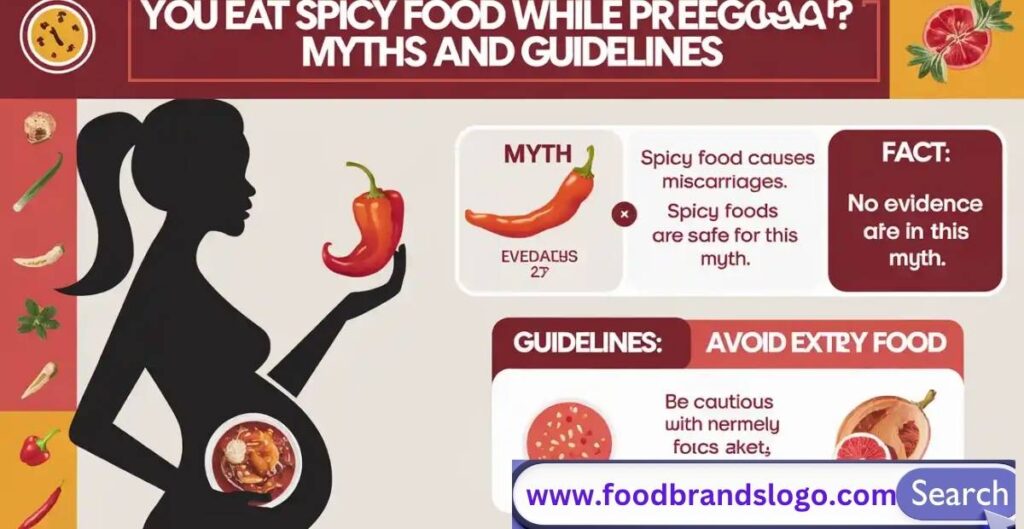Introduction
Pregnancy is an exciting journey filled with changes, emotions, and, yes, cravings. One day it might be mangoes, the next, a fiery plate of spicy noodles. But here’s the big question: Can you eat spicy food while pregnant? This age-old query pops up in almost every mom-to-be’s mind. Some believe spicy food harms the baby, while others swear it helps with labor.
In this article, we’ll dig deep into the myths and facts about eating spicy food while pregnant. We’ll cover scientific explanations, trimester-specific advice, safe alternatives, and everything in between. By the end, you’ll know exactly what’s safe, what to avoid, and how to enjoy your spicy favorites without worry.
Can You Eat Spicy Food While Pregnant? Myths And Guidelines 2025
The Science Behind Can You Eat Spicy Food While Pregnant?

Spicy food and pregnancy have long been a controversial pair. Fortunately, modern science helps clarify the situation. Generally speaking, eating spicy food during pregnancy is safe for most women, provided it’s done in moderation.
During pregnancy, your digestive system slows down due to hormonal changes, particularly an increase in progesterone. This slowdown can make it harder for your body to process spicy meals, leading to discomforts like heartburn, nausea, and indigestion. Additionally, spicy ingredients might slightly alter the taste of the amniotic fluid—something your baby can taste. However, this doesn’t harm the baby and might even help expose them to various flavors early on.
Also worth noting is how your immune system adapts during pregnancy. A weaker immune system means your body may respond differently to unfamiliar foods, so if you weren’t a fan of spice before pregnancy, it’s wise to start with mild flavors and see how your body reacts.
Benefits of Eating Spicy Food During Pregnancy
While the risks are real for some, spicy food offers several surprising benefits for expectant mothers:
Spicy ingredients like chili peppers can provide a natural metabolism boost, which helps maintain healthy weight gain. Ingredients such as garlic, turmeric, and ginger are not only flavorful—they’re also packed with anti-inflammatory and antioxidant properties, supporting immune function during pregnancy. Some spices act as natural decongestants too, which is helpful when pregnancy causes nasal congestion.
Eating flavorful food can also make your meals more satisfying. This helps you feel full and content without needing excessive portion sizes. In small amounts, spices like ginger or cumin may even aid digestion and ease mild nausea.
So while it’s not a magic health elixir, spicy food can be part of a balanced pregnancy diet if your body handles it well.
Potential Risks & Side Effects by Trimester
Each trimester brings unique bodily changes that can affect how you tolerate spicy foods. Understanding these variations helps you adjust your diet more effectively.
First Trimester
Morning sickness is common in early pregnancy, and spicy foods can often trigger or worsen nausea and vomiting. This happens because your digestive system is extra sensitive during this time. Additionally, acid reflux and indigestion can begin early in pregnancy and may be exacerbated by consuming spicy dishes.
Second Trimester
As your baby grows, your uterus starts to push up against your stomach. This can lead to increased heartburn, especially after eating spicy or greasy meals. On the flip side, you may begin to crave stronger flavors around this time, including spicy foods. Enjoy them in moderation and keep an eye on portion size to avoid discomfort.
Third Trimester
This is when the growing baby puts significant pressure on your digestive organs. Many women experience increased heartburn and acid reflux in the third trimester, and spicy foods can make these symptoms worse. Some women also find that spicy foods speed up bowel movements, which may lead to discomfort or loose stools.
In any trimester, the key is paying attention to your body. If a spicy meal causes distress, cut back or switch to a milder version.
Does Spicy Food Affect the Baby?

This is a top concern for many expectant moms. The good news is that eating spicy food during pregnancy doesn’t harm your baby or disrupt fetal development.
Your baby is protected inside the womb and nourished through the placenta. Spicy food doesn’t reach your baby directly. However, certain spices can slightly alter the flavor of the amniotic fluid, which your baby ingests and tastes. Some research suggests that babies exposed to a variety of flavors in utero may be more open to those foods after birth.
So while spicy meals won’t turn your baby into a chili-lover overnight, they might help shape early taste preferences in subtle ways.
Can Spicy Food Help Induce Labor?
You may have heard that eating spicy food can help induce labor naturally. This is a popular belief—but is there any truth to it?
Scientifically, there’s no proven link between spicy food and labor induction. Spicy foods can irritate your stomach and intestines, potentially leading to increased bowel movements or mild cramping. However, this isn’t the same as triggering true labor contractions. Some women swear that a spicy meal brought on labor, but most medical professionals view this as coincidence or placebo effect.
If you’re nearing your due date and curious, a spicy meal won’t hurt—but don’t rely on it to speed things up. Speak with your doctor about safe, evidence-based labor induction methods.
How to Eat Spicy Food Safely During Pregnancy?
Craving that hot curry or fiery taco? Go ahead—but be smart about it. Here are practical tips for safely enjoying spicy food during pregnancy:
Start with milder spice levels, especially if you didn’t eat spicy food before pregnancy. Your body may not be accustomed to processing it.
Pay close attention to how your body responds. If you feel heartburn, nausea, or stomach pain after eating spicy food, consider cutting back.
Choose natural spices and avoid heavily processed hot sauces, which may contain artificial preservatives or additives. Natural spices like turmeric, cumin, ginger, and garlic are safer and even offer health benefits.
To reduce the heat’s impact on your stomach, pair spicy foods with dairy products like yogurt or milk. These can neutralize the spice and offer some digestive relief.
Avoid eating spicy meals on an empty stomach, as this increases the likelihood of irritation. Also, drink plenty of water throughout the day to aid digestion and reduce discomfort.
Spicy Food & Pregnancy Cravings: What Do They Mean?
Many pregnant women develop intense cravings, and spicy food often tops the list. But what causes these cravings, and should you worry?
Hormonal changes during pregnancy alter your sense of smell and taste. As a result, certain flavors—especially bold ones—become more appealing. Spicy foods provide sensory satisfaction, stimulating your taste buds and even giving a small endorphin boost.
Some theories suggest cravings reflect your body’s nutritional needs, although there’s no direct link between spice cravings and specific deficiencies. Others believe it’s simply about variety and seeking new experiences during pregnancy.
Ultimately, craving spicy food is normal. Satisfy your cravings in moderation, and always listen to your body’s cues.
Safe Spicy Food Alternatives for Pregnancy
If you love spice but find it hard to tolerate during pregnancy, try gentler alternatives that offer flavor without the burn:
- Mild curry dishes made with aromatic herbs instead of intense chili
- Ginger tea, which soothes digestion and adds a warm kick
- Yogurt-based sauces like raita or tzatziki for creamy, cool relief
- Baked bell peppers that offer sweetness and mild spice
- Garlic and turmeric, both flavorful and pregnancy-friendly
- Paprika, which adds color and depth without overwhelming heat
- Pregnancy-safe spice blends free from artificial additives or MSG
- A squeeze of lemon with black pepper for a zesty but gentle flavor boost
These swaps help you enjoy the taste you love without risking discomfort.
Conclusion: Can You Eat Spicy Food While Pregnant?
Let’s wrap things up. Can you eat spicy food while pregnant? Yes, you can—if you listen to your body and practice moderation. Spicy foods don’t harm your baby and may even offer health benefits like improved digestion and enhanced flavor satisfaction.
However, depending on your trimester and how your body reacts, spicy food can trigger heartburn, nausea, or other digestive issues. Pay attention to what feels right for you and adjust your meals accordingly.
If you’re craving something bold and spicy, go ahead and indulge—just make sure it fits into a balanced diet. And when in doubt, talk to your doctor for personalized guidance.
Want to learn more? Explore our other pregnancy nutrition articles to stay informed, healthy, and happy throughout every stage of your journey!
FAQs
Is it safe to eat spicy food while pregnant every day?
Yes, it’s generally safe to eat spicy food daily if it doesn’t cause you discomfort. However, you should monitor symptoms like heartburn, acid reflux, or nausea, which may increase with frequent spicy meals.
Can spicy food cause miscarriage or harm the baby?
There is no scientific evidence linking spicy food to miscarriage or fetal harm. The baby is protected by the amniotic sac and placenta. Any effects from spice are limited to the mother’s digestive system.
Why do I crave spicy food so much during pregnancy?
Cravings are often triggered by hormonal shifts that affect taste and smell. Spicy food offers bold flavors and a quick sensory reward, which may explain the intense cravings.
Can spicy food affect the taste of breast milk after birth?
Yes, some studies suggest that spicy or strong-flavored foods can slightly alter the taste of breast milk. This isn’t harmful and might even help babies develop a broader palate over time.
Should I avoid spicy food if I have morning sickness?
If spicy food worsens your nausea or triggers vomiting, it’s best to avoid it during the first trimester. Choose bland or lightly seasoned meals until symptoms improve.
Can eating spicy food cause preterm labor?
Spicy food doesn’t cause preterm labor. It may irritate your digestive system and lead to cramping, but this is not the same as triggering labor contractions.
Are there any spices that are unsafe during pregnancy?
Most culinary spices are safe in food amounts. However, consuming high doses of certain herbs or spices (like fenugreek or licorice root) in supplement form may be unsafe. Always consult your OB-GYN before using herbal remedies.
Can babies develop a taste for spicy food in the womb?
Babies can detect flavors in amniotic fluid, including those from spicy foods. This early exposure may help them accept a wider variety of flavors after birth.

